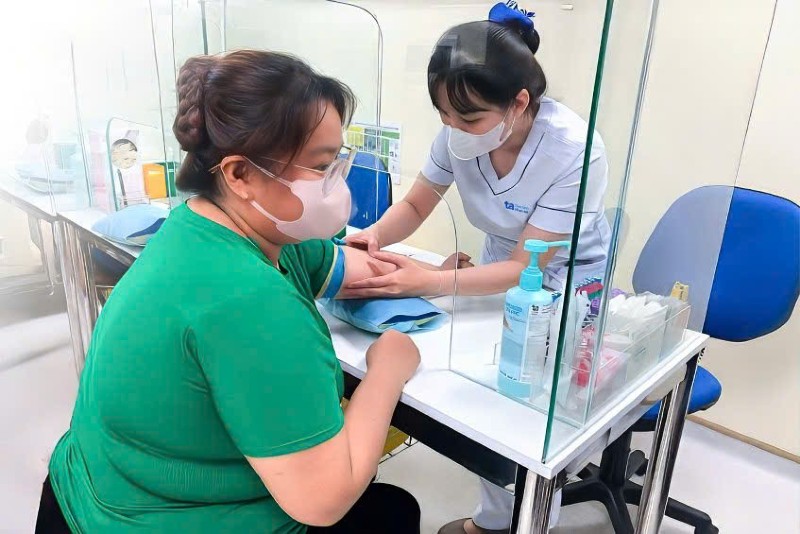Uncontrolled weight gain due to stress
In just one year, AT (23 years old, Da Lat) gained 35 kg due to prolonged stress, constant insomnia and turned to eating as a way to relieve emotions, even though she did not feel hungry at all. T. said she fell into a state of severe stress due to events in her personal and family life.
Doctors are consulting patients. |
She could not sleep at night, often staying up all night or if she tried hard, she could only sleep for 1-2 hours. The prolonged lack of sleep left T. exhausted, always feeling tired and lethargic during the day.
Unable to sleep and constantly stressed, T. began to turn to food as an escape. She shared that there were weeks when she went to buffets four times a week, eating uncontrollably, only stopping when her body could not take in any more food. “I didn’t eat because I was hungry, but just to satisfy my cravings. At that time, eating was the only way to make me feel better,” T. said.
Each meal of T. can be double or triple the amount of a normal person. In just 12 months, T.'s weight increased from 60 kg to 95 kg, causing many physical and mental consequences.
The change in appearance forced T. to constantly change her clothes from size M to XXL, unable to wear her favorite clothes again. She often felt out of breath, snoring loudly every time she took a nap, and just walking a few hundred meters made her out of breath and tired. Not only that, T.'s resistance decreased significantly.
Previously, mild colds that usually passed quickly in a few days have now become long-lasting illnesses, and T. even had to be hospitalized for the flu once. On average, every 1-2 months, she has to go to the hospital once because of illness.
T. once tried to lose weight by cutting out starch and trying to swim once a week. However, she admitted that cutting out rice but increasing the amount of meat and fish kept her weight unchanged. Unable to control her condition, T. went to the Weight Loss Center, Tam Anh General Hospital.
Here, Dr. Tran Huu Thanh Tung examined and determined that T. was severely obese, with a BMI of 37.6 (kg/m²), visceral fat exceeding 230 cm², grade 3 fatty liver and in the pre-diabetic stage. T.'s total body fat was up to 50 kg, an extremely alarming level.
According to Dr. Tung, T.'s case is typical of rapid weight gain due to stress. When stressed, the body produces a lot of the hormone cortisol, which helps the body cope with pressure. However, when cortisol levels are consistently high, it promotes fat storage, especially in the abdomen, and makes the body feel constantly hungry, leading to uncontrolled eating.
In addition, stress also increases the hormone ghrelin - the "hunger hormone", making the patient crave more food, especially foods rich in sugar and fat. These foods provide a large amount of calories, easily causing fat accumulation and causing weight gain in a short time.
Rapid, sudden weight gain not only affects aesthetics but is also a warning sign of dangerous diseases such as cardiovascular disease, high blood pressure, diabetes, endocrine disorders, liver, kidney, and bone and joint diseases.
It can also lead to sleep disorders, insomnia, disrupting metabolism, leading to further weight gain. When the body is tired and overweight for a long time, the patient is prone to depression, psychological instability, and a serious reduction in quality of life.
Faced with this situation, Dr. Tung created a comprehensive weight loss regimen for T., including drug treatment combined with nutritional counseling and exercise according to ability.
She was guided to choose foods, adjust her diet to suit her habits and preferences, and increase physical activity through activities such as swimming, walking or cycling. After the first two weeks of persistent application, T. lost 3.5 kg. This was a very positive initial result, providing great motivation for her to continue pursuing her goal.
“I wish I could return to my previous weight of 60 kg. That is my wish and the goal I set to strive for every day,” T. shared. With the support of doctors, family and her own will, T. is gradually regaining balance, not only in her figure but also in her physical and mental health.
Non-compliance with treatment, patient in critical condition with myocardial infarction
Mr. Canh, 63 years old, was admitted to the emergency room with severe chest pain and was diagnosed with severe narrowing of the right coronary artery, with the risk of a life-threatening acute myocardial infarction.
Previously, he had a history of many cardiovascular diseases such as high blood pressure, dyslipidemia and had an interventricular artery stent placed 8 years ago. However, after the intervention, he only maintained taking medication for the first few months and then arbitrarily stopped treatment and skipped regular check-ups because he thought his health was stable.
Failure to adhere to the treatment regimen for a long time has increased the risk of disease recurrence and led to serious complications. Worryingly, Mr. Canh still maintains the habit of smoking every day, a high-risk factor that can accelerate the process of atherosclerosis, causing coronary artery stenosis and increasing serious cardiovascular events.
Upon admission, the patient was ordered to undergo a coronary angiogram, which showed that the right coronary artery was 95 to 99% narrowed. Recognizing the risk of acute myocardial infarction, the doctors urgently performed coronary intervention to restore blood flow to the heart. Thanks to timely treatment, the patient's condition stabilized and he was eligible for discharge the following day.
According to Associate Professor, Dr. Pham Nguyen Vinh, Director of the Cardiovascular Center, dyslipidemia is a key factor promoting the formation of atherosclerotic plaques, which in turn causes narrowing of blood vessels, high blood pressure, myocardial infarction and stroke. In fact, nearly 50% of adults in Vietnam currently have dyslipidemia but have not been effectively controlled.
High blood pressure, often called the “silent killer,” is also a dangerous factor. 1 in 5 adults have the disease without any obvious signs or symptoms.
According to the World Health Organization (WHO), there are currently about 1.28 billion people aged 30 to 79 years old worldwide living with high blood pressure, and each year up to 9.4 million people die from causes related to this disease.
Associate Professor Vinh emphasized that, in addition to underlying diseases, unhealthy lifestyles such as smoking, non-compliance with medication, unhealthy diets and lack of physical activity are all major risk factors leading to serious cardiovascular diseases. If not detected early and intervened promptly, complications such as myocardial infarction, heart failure, and stroke can lead to serious consequences, even death.
Signs of cancer in women that cannot be ignored
Ms. CTH (41 years old, Dong Thap ) still had chest pain that lasted for three months. Thinking it was normal, she did not go to the doctor, only going to the hospital after her daughter repeatedly urged her. At the hospital, the doctors discovered a small, hard, green bean-sized tumor near the right armpit. After examination, Master, Doctor CKI Huynh Ba Tan suspected signs of breast cancer.
Mammography showed that the tumor was about 1cm in size, with irregular edges and many blood vessels – a sign of suspected malignancy. A core needle biopsy confirmed that Ms. H. had stage 0 breast cancer.
This is a very early stage of breast cancer, when malignant cells are only in the lining of the milk ducts, and have not invaded the surrounding breast tissue or metastasized to the lymph nodes. If treated properly and promptly, the chance of recovery can be up to 100%.
Immediately after the results were available, Ms. H. underwent surgery to remove the tumor and surrounding tissue with a margin of about 2cm. Doctors also took axillary lymph nodes for biopsy, the results showed no signs of metastasis. After surgery, the 3cm defect in the mammary gland was filled with a breast tissue flap to ensure aesthetics and prevent the breast from concave. Ms. H. recovered well, had no pain, and was discharged after only 12 hours.
Although surgery has completely removed the tumor and suspicious tissue, doctors still prescribe postoperative radiotherapy to minimize the risk of recurrence. This combination of treatments is essential even in stage 0, to ensure long-term effectiveness and protect remaining glandular tissue.
Dr. Tan said that stage 0 breast cancer often has no obvious symptoms and is mostly discovered by chance during screening. However, in a few cases, signs such as breast pain, palpable small lumps, nipple discharge, etc. may appear.
For women, especially those aged 40 and over, regular screening by mammography should be performed every year. For young women, even if they do not have obvious risk factors or family history, regular breast examination is still very important to detect abnormalities early.
Breast-conserving surgery, like Ms. H's, is a common treatment for early-stage breast cancer. Instead of removing the entire breast, the doctor only removes the tumor and surrounding tissue about 1-2 cm, then combines radiation therapy to destroy the remaining cells. According to research, the patient's survival prognosis after breast-conserving surgery combined with radiation therapy is no worse than that of total mastectomy.
Women also need to clearly distinguish the causes of breast pain. In addition to cancer, breast pain can originate from hormonal changes before menstruation, due to trauma to the chest area, wearing a bra that is too tight, or inflammation or infection of the mammary glands, especially when breastfeeding.
Normally, if the chest pain is due to hormones, it will decrease after the menstrual cycle. However, if the pain persists or is accompanied by unusual signs such as a hard mass, sharp pain, nipple discharge, etc., you should see a doctor immediately for timely examination and treatment.
Breast cancer has a good prognosis if detected early. Thanks to timely medical examination, Ms. H. discovered the disease at stage 0 and was treated effectively. Her story is a reminder for all women: do not be subjective with unusual signs, even the smallest ones. Regular screening and paying attention to your body are the best ways to protect your health, preserve your life and quality of life in the long term.
Source: https://baodautu.vn/tin-moi-y-te-ngay-216-tang-can-mat-kiem-soat-vi-stress-d309422.html




































































































Comment (0)